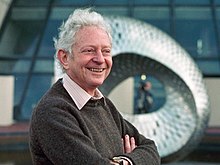Leon M. Lederman
Appearance

Leon Max Lederman (15 July 1922 in New York - October 3 2018) was an American experimental physicist who received the Nobel Prize in Physics in 1988, along with Melvin Schwartz and Jack Steinberger, for research on neutrinos. He also received the Wolf Prize in Physics in 1982, along with Martin Lewis Perl, for research on quarks and leptons. Lederman was director emeritus of Fermi National Accelerator Laboratory (Fermilab) in Batavia, Illinois. He founded the Illinois Mathematics and Science Academy, in Aurora, Illinois in 1986, where he was resident scholar emeritus from 2012 until his death in 2018.
Quotes
[edit]- Science is not about status quo. It’s about revolution.
- We are honored for research which is today referred to as the "Two Neutrino Experiment". How does one make this research comprehensible to ordinary people? In fact "The Two Neutrinos" sounds like an Italian dance team. How can we have our colleagues in chemistry, medicine, and especially in literature share with us, not the cleverness of our research, but the beauty of the intellectual edifice, of which our experiment is but one brick? This is a dilemma and an anguish for all scientists because the public understanding of science is no longer a luxury of cultural engagement, but it is an essential requirement for survival in our increasingly technological age: In this context, I believe this Nobel Ceremony with its awesome tradition and pomp has as one of its most important benefits; the public attention it draws to science and its practitioners.
- Lederman's speech at the Nobel Banquet, December 10, 1988 (URL accessed on October 20, 2008)
- Are we making more mistakes now? I don't think so. Science is a high-risk activity. And when you do science—this is very important incidentally for the general public, and for policy makers—if you are not wasting some of your money, you are not doing good science. It's a funny way to say this. You've got to back high-risk opportunities. And high-risk opportunities means some fraction of them are going to fail. And I think in any science funding scenario, you've got to say, 10, 20, maybe even 30% of your funds are going to be invested in failures.
- Comments on need for failure in scientific research.
- From the Winding Your Way through DNA symposium at the University of California, San Francisco in 1992 (URL accessed on October 20, 2008)
- I went into physics to hang around with the bright kids. I wasn't doing anything else and I didn't want to look dumb, so I thought I'd pretend to be a physicist, just like the others. It was five or ten years after my Ph.D. before I realized I was pretty good.
- From Subatomic World Explorer', as noted on American Academy of Achievement web site (URL accessed on October 20, 2008)
- That's the eureka moment, when suddenly you know something. Your hands sweat, you get into all kinds of symptoms of tremendous excitement. First of all, it's fear. Is it right? And it's incredible humor. 'How could it be any other way? It had to be that way! How could we have been so stupid, not to see this?'
- June 27, 1992 Las Vegas, Nevada interview with Lederman.
- From Subatomic World Explorer', as noted on American Academy of Achievement web site (URL accessed on October 20, 2008)
- A time traveler from the year 1899 would be continually amazed by our advanced technology—our cars and airplanes, our skyscraper cities, our TV, radio, computers, and communication abilities. Probably the traveler would be most shaken by our science, from astronomy to zoology. The only place in which this visitor would be comfortably at home is in most of our high schools.
- (2001). "Revolution in Science Education: Put Physics First!". Physics Today 54 (9): 11–13.
- Particle physics suffers more from being infected by the socio-political mood of the day than from lack of spectacular opportunities for major and profound discoveries.
- Remark by Lederman during 2002 interview.
- "Future of the field calls for charisma and courage" Kurt Riesselmann, FermiNews Volume 25, June 28, 2002, Number 11
- The main virtue of the physics-chemistry-biology sequence is the hierarchical nature of the sciences. Physics comes first because it serves as a powerul prerequisite for chemistry and because it can more clearly illustrate the nature of the scientific process.
- (2005). "Physics first?". The Physics Teacher 43 (1): 6-7. DOI:10.1119/1.1845981.
- ... I said I am doing experiments on pions. Einstein said, "Pions! Pions! We don't understand the electron. Why do you bother with pions? ..."
- (March 18, 2014)"The Moth: The Singing Janitor - Leon Lederman". World Science Festival, YouTube. (quote at 3:00 of 15:53)
Quotes about Leon Lederman
[edit]- Leon is a giant in our field in particle physics. ... he was an all-around approachable person. ... he had an open-door policy. ...
- Nigel Lockyer: (October 21, 2019)"Trailblazer of Physics: The Extraordinary Life of Leon Lederman Program". C2ST TV, YouTube. (quote at 2:01 of 1:20:44)
External links
[edit]Categories:
- Academics from the United States
- Physicists from the United States
- Inventors
- Nobel laureates in Physics
- Jews from the United States
- 1922 births
- 2018 deaths
- People from New York City
- Atheists from the United States
- Skeptics
- Nobel laureates from the United States
- Wolf Prize in Physics laureates
- National Medal of Science laureates
- Columbia University alumni
- Columbia University faculty


